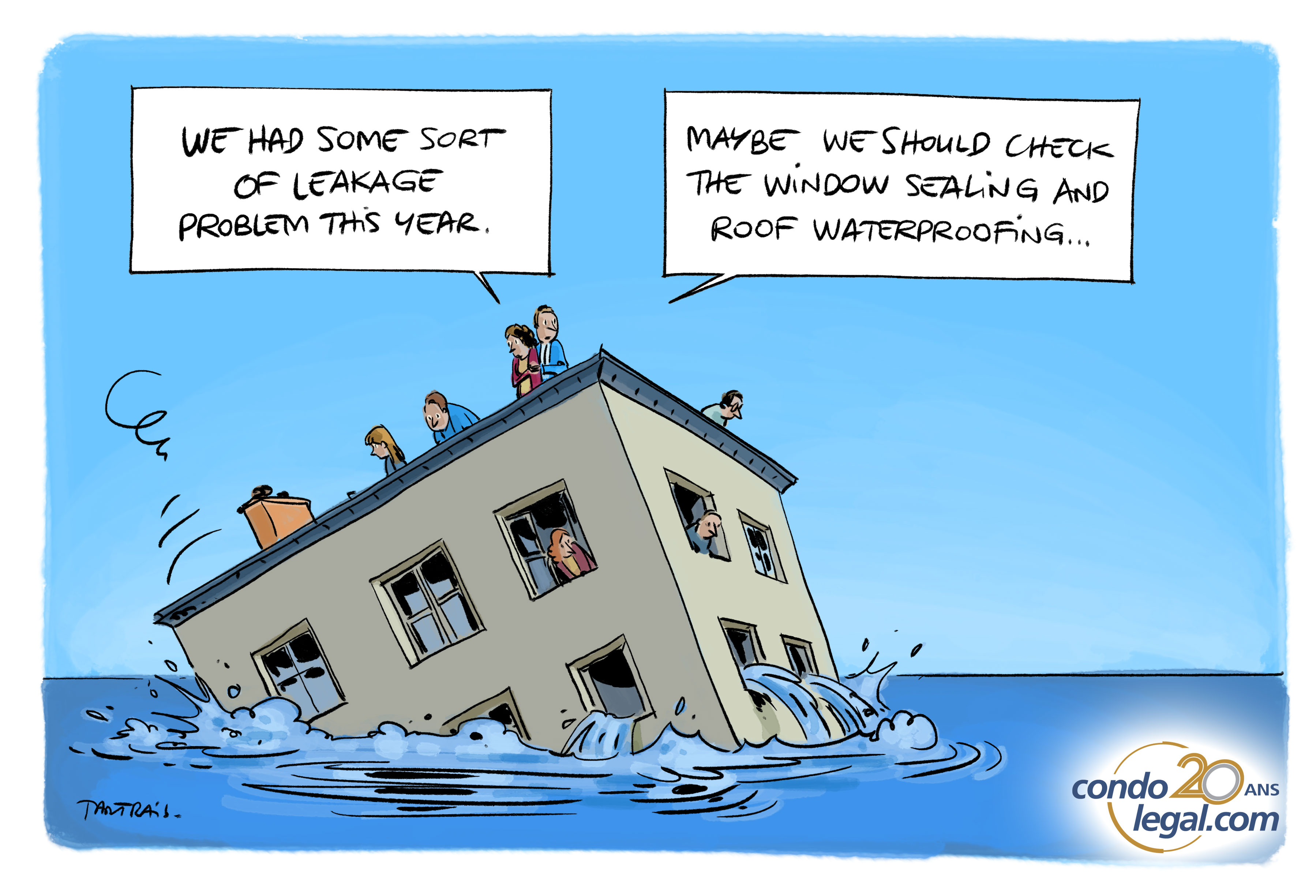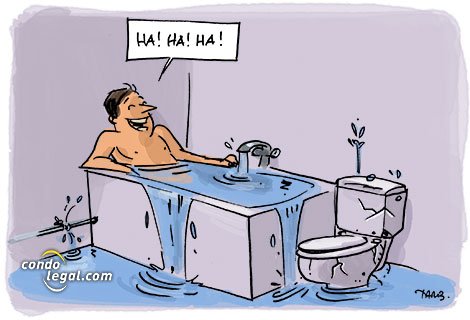
Water damages are the leading cause of loss ratio in co-ownerships (condominiums); they are also becoming more and more expensive and so, whether it concerns the syndicates of co-owners or their insurers. For reference, over the past decade, the proportion of water damages has more than doubled in immovables of co-ownerships. In order to limit the extent of damages caused by water leaks, water leak detection systems have been created to detect any abnormal amount of water on the floor; this type of system also ensures the automatic closing of the main water inlet of the apartment.
Insurers
Nowadays, insurers are requiring the installation of water leak detection systems with automatic water cut-off in the common portions as well as in the private portions; this requirement is intended to maintain the insurance coverage that the syndicate needs.
Mode of operation
Small sensors are installed in the places most prone to water leaks, that is to say washing machines, dishwashers, water heaters, toilets and sinks; when a sensor comes into contact with a small amount of water, it immediately transmits a signal to the master module which controls the automatic closure of the main water inlet of the apartment. Briefly, the speed of action of water leak detection systems makes it possible to significantly reduce the extent of the damages caused by water leaks.
Duty of the syndicate
In principle, declarations of co-ownership state that if a co-owner neglects to carry out maintenance work in his or her private portion, the syndicate may be called upon to intervene and act on its behalf; indeed, section 1039 of the Civil Code of Québec specifies that "the co-owners as a body constitute, as of the publication of the declaration of co-ownership, a legal person whose objectives consist of the preservation of the immovable, the maintenance and the administration of the common portions, the protection of the rights belonging to the immovable or the co-ownership as well as all operations of common interest while making sure that the work necessary for the preservation and the maintenance of the immovable is carried out."
In the 5th edition of her book entitled La copropriété divise, the distinguished author and notary Christine Gagnon wrote on the subject the following: "if the syndicate faces the insurer's requirement to install protection systems in the immovable against water damages with the risk of no longer having insurance coverage for any damage caused by water in the immovable, this is a matter that falls within its jurisdiction, the duty of conservation and operations of common interest that extend to the entire immovable; ensuring the immovable is certainly to see to its conservation."
Work in the private portions
The syndicate has the legal obligation to ensure the preservation of the immovable as well as the work to be carried out in the common portions and the private portions; in such a situation, section 1066 of the Civil Code of Québec specifies that no co-owner may interfere with the carrying out of work which is necessary for the preservation of the immovable and so, even if this needs to be done inside his private portion. However, if only one private portion is not equipped with the water leak detection system within the required time following the negligence or the refusal of a co-owner, the entire building would not be covered for the damages caused by water.
Always according to Me Christine Gagnon, "'the failure to do work in a single private portion could eventually cause damages to all the co-owners and the syndicate when an uncovered loss occurs; this leads to considering the water leak detection system as a common system since it protects not only the private portion but the entire immovable."
Method of distribution of the expenses
As for the method of distributing the cost generated by the installation of a water leak detection system, it depends on whether or not it is necessary to carry out such work to safeguard the insurability of the immovable; if the installation of such a system is required by the insurer or by special circumstances, this cost must be shared among the co-owners as a common charge according to the relative value of their respective fractions. In a context other than that of guaranteeing the insurability of the immovable and the affordability of the insurance premium, each co-owner will have to assume the cost according to the price of the system for their apartment.
 WHAT YOU SHOULD KNOW! The purpose of water leak detection systems is to significantly reduce the number of losses caused by water leaks; they transmit the information to an electronic module that causes the main water inlet to close.
WHAT YOU SHOULD KNOW! The purpose of water leak detection systems is to significantly reduce the number of losses caused by water leaks; they transmit the information to an electronic module that causes the main water inlet to close.
 WHAT YOU SHOULD KEEP IN MIND: It could be risky to leave it to the co-owners to install a water leak detection system when the insurer makes it a requirement; some co-owners may refuse to act on it and others may skimp on the quality and number of detection parts.
WHAT YOU SHOULD KEEP IN MIND: It could be risky to leave it to the co-owners to install a water leak detection system when the insurer makes it a requirement; some co-owners may refuse to act on it and others may skimp on the quality and number of detection parts.
 WARNING! When the installation of a water leak detection system is not required by the insurer or by the increase in premiums or deductibles, the imposition of such an installation on a co-owner in his private portion can be justified only if the actual preservation of the immovable requires it.
WARNING! When the installation of a water leak detection system is not required by the insurer or by the increase in premiums or deductibles, the imposition of such an installation on a co-owner in his private portion can be justified only if the actual preservation of the immovable requires it.



